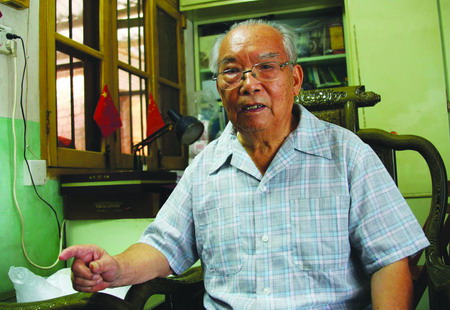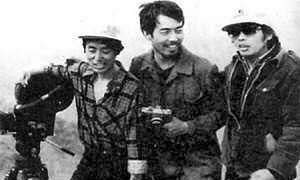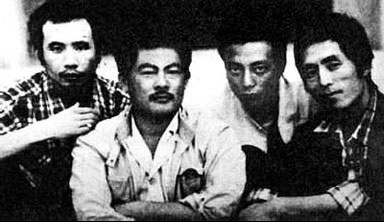Life and Leisure
Reeling in the years
By Huang Zhaohua and Huang Feifei (China Daily)
Updated: 2010-10-26 08:01
 |
Large Medium Small |
|
 Wei Bida, former president of Guangxi Film Studio, recalls the day Zhang Yimou and three other graduates from the Beijing Film Academy first set foot in Nanning, capital of Guangxi Zhuang autonomous region. Huo Yan / China Daily |
It was as part of the Guangxi Film Studio "youth team" that Zhang Yimou found his feet as a filmmaker. The rest is history. Huang Zhaohua and Huang Feifei report
China's best-known filmmaker Zhang Yimou wears many hats and one of them is honorary president of Guangxi Film Studio. The studio is Zhang's danwei, the work unit that employed him in 1982 after he graduated from Beijing Film Academy. Technically, for the past 28 years, he has been an employee of this studio. He even keeps a danwei apartment there, even though he does not live in it.
Wei Bida recalls the day when Zhang first set foot in Nanning, capital of Guangxi Zhuang autonomous region, where the studio is located.
"We asked for 12 graduates from the Beijing Film Academy, and we wanted the best. However, 10 were assigned and only four showed up, including Zhang," recalls Wei, then president of the studio.
"It was an autumn day when they arrived. I went to the railway station to pick them up. I cannot remember how they were dressed or other details, but my first impression of Zhang was, this is a young man with his feet on the ground."
The Guangxi studio was not known for amenities and the housing was inadequate. Still, each of the four newcomers was given a 60-square-meter unit, "which was way above average at that time".
The difficulty of drafting fresh talent into the Guangxi studio was understandable given that China's film industry has always been concentrated in metropolises such as Beijing and Shanghai. Yet, what seemed like a cruel twist of fate to those consigned to the minor studio turned out to be a blessing in disguise - college graduates were assigned jobs and if you didn't go, you were jobless.
Guangxi Film Studio was established in 1958, but in its early years did only documentaries and dialogue dubbing (into ethnic languages). Feature filmmaking did not start until 1975.
The year Zhang was enrolled in Beijing Film Academy was also the year Wei Bida was assigned a leadership role at Guangxi Film Studio. Before that, he worked at Guangxi Agriculture Institute.
By 1982, the studio had made a dozen features, none prominent enough to catch public or critical attention. In fact, few in China had heard of the studio.
"We must inject fresh blood into our workforce - people who are professionally trained," Wei says he argued at the time.
Half a year after their arrival, the quartet of young guns made a joint proposal: They wanted to make movies "independently".
That was unheard of. The practice then was to use a graduate as an assistant for seven to eight years. There were a lot of old-timers who were on the waiting list. Zhang and his comrades were essentially asking for the rules to be bent in their favor.
Their proposal threw a giant rock into a peaceful pond, causing all kinds of responses, and some felt it was outrageous. It was up to Wei to make the final call and he broke convention by giving the green light to the four men, average age 27. Thus was founded the "youth team".
"It was unprecedented for a college graduate without even a full year of experience to independently handle a project, at least not since the founding of New China," Wei says.
The first project was One and Eight, adapted from a poem. Zhang Yimou was one of the cameramen while Zhang Junzhao acted as the director. Although management had taken a bold step, they kept a close watch. All the top managers participated in the script's approval.
By the early summer of 1983, Wei visited the team on location and reviewed their dailies, footage shot every day.
"Artistically they strove for innovation. Zhang Yimou's photography was bold in color, lighting and composition. He often presented half a face, which was quite shocking," Wei says.
The film cost 500,000 yuan ($75,000) and took nearly three months to complete. But it was criticized as a sample of "bourgeois liberalization".
Amid the stern denunciations and slogan shouting, Wei defended the "innovative spirit" of the young filmmakers.
"We should care for them and not thwart their enthusiasm. Chinese cinema will have no future if we do not let the young generation give full play to their talent."
|
Zhang Yimou (left) and Chen Kaige (center) film Yellow Earth in 1984. File Photos |
When Zhang Yimou was making Yellow Earth, again as cameraman, someone who had made a recording of Wei's speech played it for him and his comrades while they were on location. They were so moved they wrote to Wei to express their gratitude.
After 11 months of positive word-of-mouth, the film finally got cleared for release. That was in October 1984, and the rest is history.
Both One and Eight and Yellow Earth got international prizes and are now regarded as milestones in the history of Chinese cinema. They marked the beginning of the so-called "Fifth Generation" and also put Guangxi Film Studio squarely on the map of cinephiles.
"Zhang Yimou wrote to me that 1984 was the studio's golden year. We made history with two masterpieces, and they also brought in 2.5 million yuan in profit," Wei says.
Wei plays down his role as the guy who spotted the winning horse.
"The achievements of Zhang Yimou and his cohort were the result of their work ethic, relentless pursuit of excellence and willingness to artistically explore uncharted waters," sums up Wei, who is now 87 and long retired. "He is very hardworking. He would often study a script while munching on what passed as lunch. And he is extremely intelligent."
Wei recounts a story about Zhang making Yellow Earth and not being able to visit his daughter who was ill at home.
"When I heard of this, I asked someone to send 50 yuan to his family, which at that time amounted to almost his monthly salary."
Zhang didn't know about this, but he knew it was people like Wei who stood by him when he most needed support. No wonder the master still keeps his affiliation with the studio, even though he has since made the world his oyster.
|
He Qun, Zhang Junzhao, Xiao Feng and Zhang Yimou (from left to right) founded the "youth team" of Guangxi Film Studio after graduating from Beijing Film Academy. File Photos |

